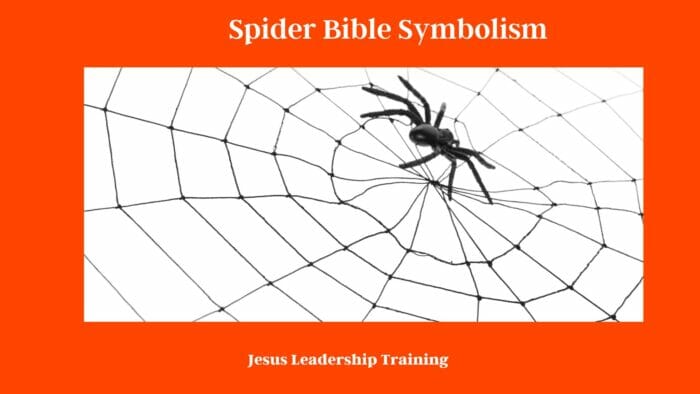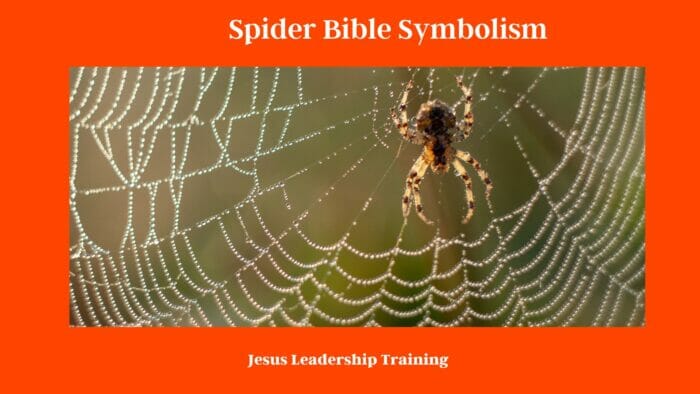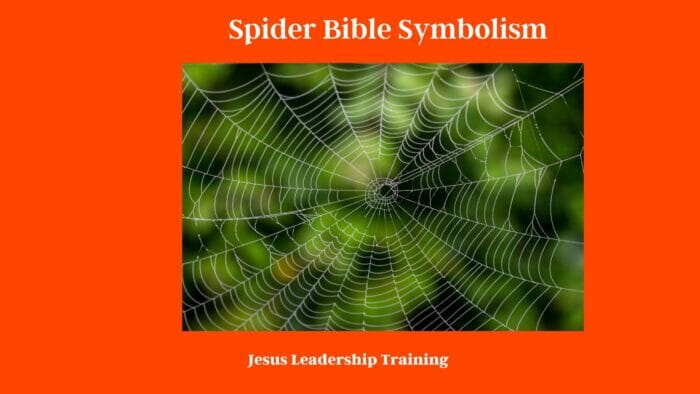:Delve into the fascinating world of spider Bible symbolism, where we explore the intricate connections between spiders and the Holy Scriptures. Uncover the profound meanings behind these arachnids and their significance in religious contexts.
Welcome to a captivating journey through the enigmatic world of spider Bible symbolism. Throughout history, spiders have woven their way into various cultures and belief systems, leaving behind a web of intriguing allegories and spiritual interpretations. In this comprehensive article, we will explore the profound and symbolic connections between spiders and the Bible, shedding light on the mystical meanings that have captured the imagination of humanity for centuries.
The Word Spider is used three Times in the Bible
Table of Contents
Spider Bible Symbolism: Weaving a Divine Narrative
The spider Bible symbolism represents a unique tapestry of spiritual connections that span different stories, verses, and themes within the Holy Scriptures. Let us navigate this intricate web of meaning and uncover its secrets.
Spiders are mentioned very few times in the Bible. Here are those instances:
- Job 8:14: “What he trusts in is fragile; what he relies on is a spider’s web.”
- Explanation: This verse is part of a speech by Bildad, one of Job’s friends, who suggests that those who forget God have a misplaced trust, as weak as a spider’s web.
- Isaiah 59:5: “They hatch the eggs of vipers and spin a spider’s web. Whoever eats their eggs will die, and when one is broken, an adder is hatched.”
- Explanation: The Prophet Isaiah compares the actions of deceitful people to those who produce spider’s webs. The web here symbolizes plans that are poorly made or actions that are unproductive or harmful.
- Proverbs 30:28: “The spider skillfully grasps with its hands, And it is in kings’ palaces.”
- Explanation: The spider is used in this Proverb as an example of a small creature with wisdom. Despite its size, it can build its home even in a king’s palace.
Remember that the Bible has been translated into many different languages and versions. Therefore, in some translations, spiders might be referred to with different terminologies.

The Weaver’s Craft: Spiders in Ancient Mythology
In ancient mythology, spiders often represented skilled weavers and architects, reflecting their ability to craft intricate webs with precision and creativity. These arachnids were regarded as symbols of craftsmanship and divine design, echoing the notion of a higher power guiding creation.
Sure, here’s a table of the use of spiders in various mythologies:
| Mythology | Spider Symbolism | Notable Stories |
|---|---|---|
| African (Akan) | Wisdom, creativity, storytelling | Anansi the Spider, a trickster god often depicted as a spider, is a major figure in West African and Caribbean folklore. He is considered the god of all knowledge of stories and is often associated with wisdom and cunning. |
| Native American | Patience, Persistence, Creativity | In Hopi mythology, Spider Woman (also called Spider Grandmother) is an important creator deity. She helped the twin deities Poqanghoya and Palongawhoya to create the world. |
| Greek | Punishment, Hubris, Skill | The story of Arachne, a mortal woman who was transformed into a spider by Athena. Arachne boasted that her weaving skills were superior to Athena’s, which led to her transformation as a punishment for her hubris. |
| Japanese | Seduction, Illusion, Danger | The Jorōgumo is a creature from Japanese folklore which can change its appearance from a beautiful woman to a giant spider, often luring and preying on men. |
| Australian Aboriginal | Creation, Land Formation | In some Aboriginal Australian myths, spider-like beings are credited with shaping the landscape and creating human beings. |
| Baltic (Latvian) | Fate, Destiny | The goddess Laima, who determines the lifespan and destiny of humans, has some associations with spiders. She is often depicted surrounded by them, possibly symbolizing the threads of fate. |
Please note that the symbolism of spiders can vary greatly depending on the cultural context and specific stories in which they appear.

Spiritual Lessons we Can Learn from Spiders
Sure, here’s a table of spiritual lessons that can be gleaned from observing spiders:
| Spiritual Lesson | Explanation |
|---|---|
| Patience | Spiders are noted for their patience. They spin their webs and then wait for their prey to become ensnared. This teaches us the value of patience and the benefit of waiting for the right opportunity. |
| Perseverance | If a spider’s web is destroyed, it doesn’t give up but begins to rebuild. This can remind us to persevere in the face of adversity and to keep going, even when things don’t go as planned. |
| Creativity | The intricate and unique design of each spider’s web is a testament to creativity and individual expression. This can encourage us to embrace our own creativity and make our unique mark on the world. |
| Precision | Spiders weave their webs with incredible precision and attention to detail. This can remind us of the importance of being meticulous and thorough in our endeavors. |
| Solitude | Many spiders are solitary creatures, teaching us the importance of being comfortable with our own company and the value of solitude in fostering self-reliance and personal growth. |
| Strategy | Spiders craft their webs in strategic locations to maximize their chances of catching prey. This can remind us of the importance of strategic planning in achieving our goals. |
| Transformation | The process of molting that spiders go through as they grow can symbolize transformation and personal growth. It can serve as a reminder that change is a necessary part of life and personal development. |
Remember, symbolism and lessons can vary greatly depending on cultural, personal, and situational context.

Etymology of the Biblical Word Spider
The etymology of the word “spider” is one that has a long and varied history. This article will explore the origin of the word, as well as its development in various languages, such as Hebrew, Greek, Aramaic, and Latin.
Origin
The exact origin of the word “spider” is uncertain, but it is thought to have originated in the Middle East. The Old Testament mentions the creature “spider” several times, which suggests a Hebrew origin. The word appears in the early 17th century in the King James version of the Bible, where it is translated as “spyder”.
Hebrew
In Hebrew, the word “spider” is spelled as “shalakh”, which means “strangler” or “grabber”. This is due to the creature’s web-spinning habits, which can be seen as a form of trapping prey.
Greek
The Greek word for “spider” is “arachne”, which can be translated as “spinner” or “weaver”. This is likely related to the myth of Arachne, the mortal woman who was transformed into a spider as punishment for challenging the goddess Athena.
Aramaic
In Aramaic, the word for “spider” is “abrak”, which can be translated as “spider” or “thread”. This likely comes from the Aramaic word “barka”, which refers to the sticky, web-like material that spiders use to catch their prey.
Latin
In Latin, the word for “spider” is “aranea”, which can be translated as “spider” or “weaver”. This is likely related to the myth of Arachne, the mortal woman who was transformed into a spider as punishment for challenging the goddess Athena.
The etymology of the word “spider” is one that has a long and varied history. It is thought to have originated in the Middle East and is used in various languages, such as Hebrew, Greek, Aramaic, and Latin. In each language, the word has a slightly different meaning, but all refer to the creature’s web-spinning habits.

The Tale of Arachne: A Lesson in Humility
The story of Arachne in Greek mythology is reminiscent of the biblical concept of humility. As a gifted mortal weaver, Arachne challenged the goddess Athena, resulting in her transformation into a spider as a punishment. This tale conveys the importance of respecting divine authority and the consequences of hubris.
Sure, here is a table summarizing the main facts about the story of Arachne in Greek mythology:
| Fact | Description |
|---|---|
| Protagonist | Arachne, a young woman known for her extraordinary weaving skills. |
| Arachne’s Pride | Arachne was so skilled that she dared to claim her work was superior to that of Athena, the goddess of wisdom, handicrafts, and strategic warfare, including weaving. |
| The Challenge | Hearing of Arachne’s claim, Athena was angered and disguised herself as an old woman to give Arachne a chance to recant. Arachne refused and challenged the disguised Athena to a weaving contest. |
| The Contest | Both Athena and Arachne set to work. Athena’s tapestry depicted the gods in their glory, with a particular focus on the punishments they meted out to mortals who defied them. Arachne, on the other hand, chose to portray the gods’ misdeeds and deceptions, especially their abuses of mortal women. |
| The Outcome | When Athena saw that Arachne’s work was flawless and even depicted the gods’ wrongdoings, she was enraged. |
| Athena’s Wrath | In her fury, Athena destroyed Arachne’s tapestry and loom, and turned Arachne into a spider, condemning her and her descendants to weave for all eternity. |
| Symbolism | The story of Arachne is often seen as a cautionary tale about the dangers of hubris (excessive pride or self-confidence), and the consequences of challenging the gods. |
| Impact on Culture | The story of Arachne is the source of the term ‘arachnid’, a scientific term for spiders. |
This mythological tale has been depicted in various forms of art and literature over the centuries, reinforcing its themes and cultural significance.
The Spider’s Patience: Waiting on the Lord
In both the Old and New Testaments, the virtue of patience is emphasized, often associated with the symbolism of spiders and their patient approach to building their webs. This symbolism encourages believers to trust in divine timing and to wait on the Lord’s guidance.

Spider Webs: Symbol of Unity and Interconnectedness
Spider webs, with their intricate patterns, serve as symbols of unity and interconnectedness in various cultures. In the context of the Bible, this symbolism reflects the idea of how humanity is interconnected in the eyes of God and how we are all part of a greater divine plan.
Spider Symbolism in Psalms: God’s Protection
In several Psalms, spiders are indirectly mentioned as symbols of divine protection. Just as a spider guards its dwelling, God is portrayed as a protective force that watches over and shelters His people.
Spider Symbolism in Proverbs: Industry and Diligence
In the Book of Proverbs, the diligence and industriousness of spiders are referenced, urging readers to emulate these qualities in their work and daily lives. Spider Bible symbolism here encourages the pursuit of excellence and dedication in one’s endeavors.
Spiders in Christian Art: Depicting the Divine Message
Christian art has often depicted spiders as symbols of, patience, and creativity. From medieval tapestries to Renaissance paintings, spiders have found their way into religious art, imbuing it with rich layers of symbolism and meaning.
Spider Symbolism in Dream Interpretation: Unraveling the Subconscious
Across cultures, dreams featuring spiders carry various interpretations. In the context of biblical dream symbolism, spiders may represent spiritual guidance or subconscious messages from the divine.
Sure, here is a table summarizing the various interpretations of spiders in dreams:
| Symbolism | Interpretation |
|---|---|
| Spider weaving a web | This often symbolizes a period of creativity, hard work, and perseverance. It can also suggest that you’re being pulled into a complex network of deception or a sticky situation. |
| Spider climbing up a wall or other structure | This can represent advancement, especially in the professional sphere. It suggests that through diligence and careful work, you’re climbing the ladder of success. |
| Killing a spider | This might symbolize overcoming a challenge or adversary. It can also indicate a desire to remove a feminine influence, especially a controlling one, from your life. |
| Being bitten by a spider | This dream could indicate a conflict with a dominant female figure in your life. It can also represent a force that is draining your energy or vitality. |
| A spider descending upon you | This might signify you feel like an outsider or are undergoing a period of isolation. You might be feeling like a prey, overwhelmed by some dominant force. |
| A large or monstrous spider | This can represent a powerful, overwhelming fear or anxiety in your waking life. |
| Spider laying eggs | This can symbolize the feminine aspects of your personality or the presence of a maternal figure in your life. It might also denote prosperity and abundance. |
Please note, dream interpretation is highly subjective and can vary greatly depending on personal experiences, cultural background, and individual beliefs. This table presents common interpretations, but they might not be universally applicable or accurate for everyone. Always consider personal context when interpreting dreams.
Spider Bible Symbolism in Modern Culture: Resonating Themes
Even in contemporary times, spider Bible symbolism continues to captivate and inspire. Its themes of patience, creativity, and divine protection find resonance in literature, movies, and popular culture.
Arachnophobia and Spiritual Lessons: Overcoming Fear
Arachnophobia, the fear of spiders, is a common human phobia. Exploring the spiritual lessons of overcoming fear and finding strength can provide valuable insights from spider Bible symbolism.
Spiders and Divine Balance: Understanding Duality
In some belief systems, spiders symbolize the delicate balance between light and darkness, good and evil. This dualistic aspect of spider symbolism reminds us of the need for harmony and equilibrium in our spiritual journey.
Spiders as Symbols of Transformation: Spiritual Metaphors
The process of a spider spinning its web and shedding its skin symbolizes transformation and rebirth. This parallel to spiritual growth and evolution is a central theme within spider Bible symbolism.
Spiders and Divine Feminine Energy: Maternal Weavers
In certain cultures, spiders are associated with the divine feminine energy, linked to nurturing and creative aspects. Exploring this aspect of spider Bible symbolism can deepen our understanding of the feminine divine.
Spider Symbolism in the Book of Job: Understanding Divine Mystery
The Book of Job references spiders as a part of God’s intricate creation, showcasing the vastness of divine wisdom beyond human comprehension. This symbolism invites us to embrace the mystery of the divine.
A spider is a fascinating creature that exemplifies both fragility and strength in distinct ways. These dichotomous qualities are largely attributable to the spider’s physical structure and its incredible adaptive capabilities. Below are the primary reasons a spider is seen as both fragile and strong:
- Physical Structure: Despite their small size and seemingly delicate bodies, spiders possess a significant amount of strength relative to their size. For instance, a spider’s silk is notably robust. Its tensile strength is comparable to alloy steel, and it’s proportionally stronger than a thread of steel of the same thickness. This strength is essential to the spider’s survival, as it relies on its web to capture prey and often to provide shelter.
- Predation and Defense Mechanisms: Spiders are agile and adept hunters, using speed, venom, and the strength of their webs to capture and immobilize prey. This exhibits their strength. However, they are also susceptible to predation and environmental factors, which can make them seem fragile. A sudden rainstorm can destroy a spider’s web, leaving it exposed and vulnerable, and larger animals can easily harm or kill spiders.
- Life Cycle: Spiders can lay hundreds of eggs at a time, signifying the strength and continuation of their species. However, many spiderlings don’t survive to adulthood due to predation and harsh environmental conditions, emphasizing their fragility.
- Adaptability: Spiders are found in almost every terrestrial habitat on Earth, from the freezing cold of the Arctic tundra to the scorching heat of desert dunes. This adaptability underscores their strength. Still, habitat destruction, pollution, and climate change can significantly impact their populations, underlining their fragility.
- Size and Visibility: While their small size often allows spiders to evade detection, it also contributes to their vulnerability. Spiders can be easily squashed underfoot or swatted away, inadvertently or purposefully harmed due to their small stature and the widespread fear they elicit in many humans.
Therefore, while spiders demonstrate impressive strength and resilience in many ways, they are also fragile beings highly susceptible to the dangers of their environments and their predators, including humans.
Spiders in Christian Symbolism: Decoding Iconography
Christian iconography often includes spiders in their representations, each carrying unique symbolism. Decoding these symbols allows for a deeper appreciation of the complex web of meanings within religious art.
Spiders and Spiritual Perseverance: Fortitude in Faith
The resilience and determination of spiders in constructing their webs serve as a reminder of the importance of spiritual perseverance and unwavering faith in the face of challenges.
Spiders and Spiritual Healing: Weaving Wholeness
In some spiritual practices, spiders are connected with healing and restoration, symbolizing the weaving of brokenness into wholeness. This symbolism emphasizes the transformative power of spirituality.
Final Thoughts – Spider Bible Symbolism
As we reach the end of our exploration into the captivating world of spider Bible symbolism, we find ourselves entangled in a profound web of spiritual significance. From ancient mythologies to contemporary interpretations, spiders have intricately woven their way into the tapestry of religious thought. As we continue to delve deeper into these symbolic connections, let us reflect on the lessons of patience, creativity, and divine protection that spiders teach us. May we embrace the enduring message of spider Bible symbolism, finding solace in its timeless wisdom.




